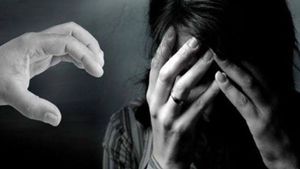Pasar Minggu Station, South Jakarta, witnessed how a mother was desperate to attempt suicide last weekend. Since yesterday afternoon, netizens' attention has been sucked in a viral video showing a mother being secured by KAI officers and other passengers.
In the video, it is narrated that a mother wants to throw the baby on the Electric Train Railroad (KRL) Pasar Minggu Station. A KAI officer can be seen trying to calm the mother, while the other officer is holding the baby, which is known to be the mother's child. The mother had rebelled when calmed down.
pic.twitter.com/gTHEZC1b2t
— Michael (@jangansokkerass) September 4, 2023
pic.twitter.com/gTHEZC1b2t
The Head of Pasar Minggu Police, Kompol David Pratama Purba, explained that this heartbreaking incident occurred on Saturday (2/9/2023). However, the woman did not want to throw away the baby as narrated in the video. The mother apparently attempted suicide at the railroad crossing.
"Information from the train station was not the discovery of a baby, but it was someone who wanted to attempt suicide. From the officer's information, the mother wanted to commit suicide," said Commissioner David.
It is not known what motive the mother was desperate to end her life. But it is likely that she will experience stress. The World Health Organization (WHO) defines stress as a state of worry or mental tension caused by difficult situations.
Stress is a natural human response that encourages us to overcome the challenges and threats in our lives. Everyone is stressed to some extent. However, the way we respond to stress makes a big difference to our overall welfare.
In the world of parenting, the term "blues bay" and "Postpartum Depression" (PPD) are usually used to describe mothers who experience stress after giving birth. Based on a viral video about a mother who wants to end her life, it is likely that she will experience a blues bay or even PPD.
Being a mother is not easy. In addition to fatigue in taking care of babies, changes in body shape, demands from the environment, it also often makes mothers after giving birth more at risk of experiencing stress. Mood swing or mood swings that often change are generally experienced by mothers who have just given birth.
Baby blues is considered the form of depression after the lightest delivery, but still should not be ignored. Not a few women feel confused themselves because they feel sad after experiencing a happy event, namely giving birth.
But unfortunately, what happens usually mothers are reluctant to talk about this feeling to other people, including their partners. When talking about emotions and all the changes after giving birth, is one of the best ways to deal with the bluesbaby.
Citing the American Pregnancy Association, about 70-80% of new mothers experience negative feelings or changing moods after giving birth. Symptoms of the blues usually start attacking mothers between four and five days after giving birth. The exact cause of the mother's illness is unknown until now.
But still from the same source, the blues baby is closely related to hormonal changes experienced during pregnancy to childbirth. This hormonal change has the potential to cause chemical changes in the brain that cause depression. In addition to hormonal changes, fatigue after giving birth can also be the cause of the mother's stress to experiencing the bluesbaby.
Olphi Disya Arinda, a clinical psychologist, said sadness dominated the mood of the mother who had just given birth. Disya also dismissed the notion that the baby blues indicated that the mother was weak.
Baby blues is more of a mododic that is dominated by sadness and anxiety after giving birth. The blues baby occurs faster, which is one or two days after giving birth. Usually influenced by maternal physiological changes, such as hormones, physical problems, and so on. The myth is that the blues baby is only experienced by spoiled or weak mothers. In fact, the blues can be experienced by any mother, "said Disya.
Maybe there are still many who think the baby blues and PPD are the same. In fact, these are actually two different conditions. The similarity is that these two terms occur after giving birth, either with a baby alive or dead, and are dominated by feelings of sadness.
Unlike the blues bay, PPD usually begins to experience mothers one month after giving birth and the duration is longer up to. In the PPD case, not a few are characterized by the urge to hurt yourself or the baby.
Quoted from Womens Health, the Postpartum Depression is a serious mental illness that involves the brain and has an impact on physical behavior and health. Someone who experiences PPD usually feels sad and empty every day. Mothers who experience PPD also feel unconnected with the baby, as if she is not her mother. And worse, the mother may feel in love and doesn't care about the baby.
"The symptoms of PPD often make the mother lose the sense of motherhood that is needed in parenting," said Disya again.
Like the blues bay, the cause of PPD is also not known for sure. However, Womens Health writes hormonal changes can trigger PPD. According to experts, changes in the hormot level can suddenly trigger depression. This is similar to hormonal changes before women experience menstruation, but at a more extreme level.
PPD must be handled seriously, and even need experts to treat it. When PPD is not treated, mothers after giving birth have the potential to not have enough energy to take care of their babies and themselves, changing periods, to feelings of suicide.
Furthermore, Disya Arinda also emphasized the importance of the role of husband in parenting. According to him, husbands also have a similar and large obligation to raise and raise children.
The task of parenting must be carried out by the father and mother. It needs to be explored what the role of her husband is. Why do you feel such a heavy burden on the mother? " said Disya.
VOIR éGALEMENT:
The English, Chinese, Japanese, Arabic, and French versions are automatically generated by the AI. So there may still be inaccuracies in translating, please always see Indonesian as our main language. (system supported by DigitalSiber.id)

















